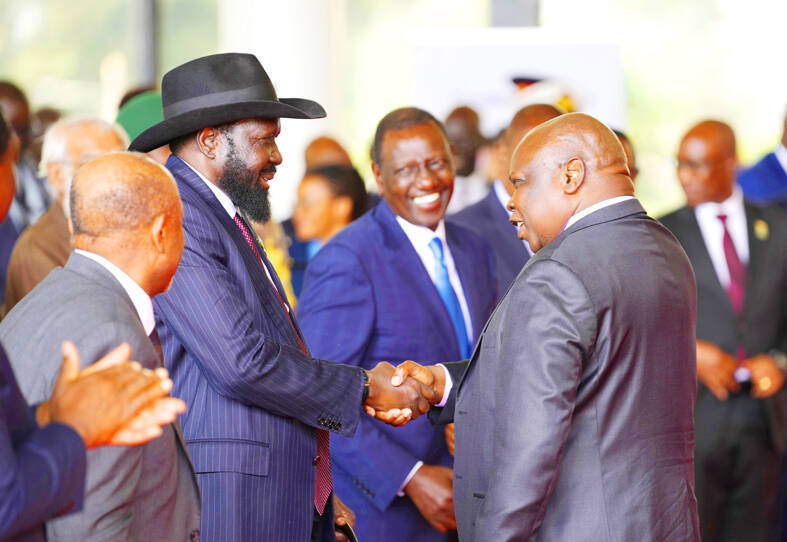South Sudan peace talks that almost reached completion faced a stumbling block, with opposition groups demanding that a newly passed bill allowing the detention of people without an arrest warrant be scrapped before they would sign a proposed deal.
Kenya has been hosting the high-level meetings since May between government representatives and rebel opposition groups who were not part of a 2018 agreement that ended a five-year civil war, leaving about 400,000 people dead and millions displaced.
Despite the agreement, violence often erupted in the country of 9 million people.

Photo: AP
Pagan Amum Okiech, negotiating on behalf of the South Sudan Opposition Movement Alliance, told reporters on Tuesday that it would be “meaningless to sign any agreement if the draconian National Security Act is signed into law by the president.”
Last week, parliament voted in favor of the 2015 bill and South Sudanese President Salva Kiir has to approve it within 30 days for it to become law.
This comes ahead of the country’s first-ever election on Dec. 22.
“This law violates the fundamental rights and freedoms of South Sudanese citizens, it eliminates civic and political space,” Amum said. “There can be no peace or democracy under such a law.”
Attending the peace talks is Edmund Yakani, executive director of the Community Empowerment for Progress Organization, a non-profit that engages university students and fresh graduates.
Yakani said that the security bill “created a negative spirit for the negotiations.”
Human Rights Watch has also called on Kiir to reject the bill, saying that it would further undermine human rights and boost national security agencies that have a history of rights abuses.
The talks have resulted in a draft agreement proposing to extend the country’s transitional period and postpone the election to allow finishing up the country’s constitution and electoral laws, as well as set up constituency borders and a unified security force as proposed in the 2018 peace talks.
Some Western envoys also recommend delaying the poll “to guarantee a free and fair election.”

SECURITY: As China is ‘reshaping’ Hong Kong’s population, Taiwan must raise the eligibility threshold for applications from Hong Kongers, Chiu Chui-cheng said When Hong Kong and Macau citizens apply for residency in Taiwan, it would be under a new category that includes a “national security observation period,” Mainland Affairs Council (MAC) Minister Chiu Chui-cheng (邱垂正) said yesterday. President William Lai (賴清德) on March 13 announced 17 strategies to counter China’s aggression toward Taiwan, including incorporating national security considerations into the review process for residency applications from Hong Kong and Macau citizens. The situation in Hong Kong is constantly changing, Chiu said to media yesterday on the sidelines of the Taipei Technology Run hosted by the Taipei Neihu Technology Park Development Association. With

CARROT AND STICK: While unrelenting in its military threats, China attracted nearly 40,000 Taiwanese to over 400 business events last year Nearly 40,000 Taiwanese last year joined industry events in China, such as conferences and trade fairs, supported by the Chinese government, a study showed yesterday, as Beijing ramps up a charm offensive toward Taipei alongside military pressure. China has long taken a carrot-and-stick approach to Taiwan, threatening it with the prospect of military action while reaching out to those it believes are amenable to Beijing’s point of view. Taiwanese security officials are wary of what they see as Beijing’s influence campaigns to sway public opinion after Taipei and Beijing gradually resumed travel links halted by the COVID-19 pandemic, but the scale of

A US Marine Corps regiment equipped with Naval Strike Missiles (NSM) is set to participate in the upcoming Balikatan 25 exercise in the Luzon Strait, marking the system’s first-ever deployment in the Philippines. US and Philippine officials have separately confirmed that the Navy Marine Expeditionary Ship Interdiction System (NMESIS) — the mobile launch platform for the Naval Strike Missile — would take part in the joint exercise. The missiles are being deployed to “a strategic first island chain chokepoint” in the waters between Taiwan proper and the Philippines, US-based Naval News reported. “The Luzon Strait and Bashi Channel represent a critical access

Pope Francis is be laid to rest on Saturday after lying in state for three days in St Peter’s Basilica, where the faithful are expected to flock to pay their respects to history’s first Latin American pontiff. The cardinals met yesterday in the Vatican’s synod hall to chart the next steps before a conclave begins to choose Francis’ successor, as condolences poured in from around the world. According to current norms, the conclave must begin between May 5 and 10. The cardinals set the funeral for Saturday at 10am in St Peter’s Square, to be celebrated by the dean of the College